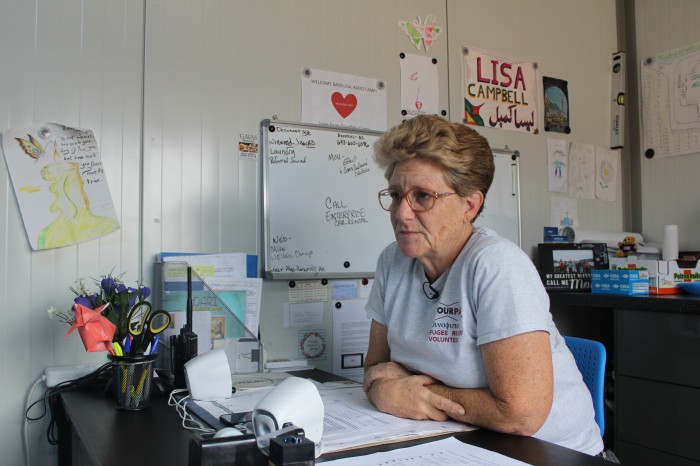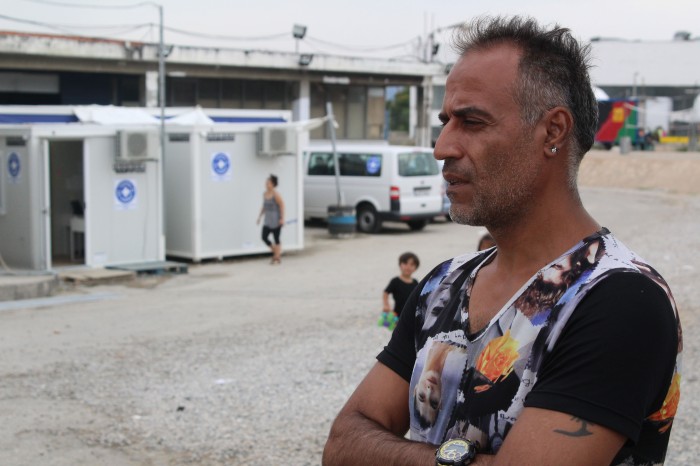Story by Sophie Cannon ·
This post can also be found at https://nujournalismingreece2017.wordpress.com/2017/06/12/the-others-greeces-forgotten-refugee-population/
OINOFYTA, Greece – United Nations tents and isoboxes are scattered around the grounds, shoeless boys play soccer in dimly lit halls and seemingly happy murals decorate the walls of families on boats. But on close inspection, the people are actually painted as ghosts, lost at sea.
Inside the refurbished factory building-turned-camp, the daily lives of the refugees unfold. A communal kitchen anchors the space, hallways branching off into one-room living spaces and community rooms. This appears to be the image of the refugee crisis straight out of news reports, broadcast to the world since 2015. But this is not what the world has come to know as the Syrian crisis. These are the others – from countries including Afghanistan, Iran and Pakistan.

A mural painted by one of the child residents of the camp, depicting those who were lost on the journey from Afghanistan to Greece.
Photo by Sophie Cannon
The Oinofyta refugee camp, located about an hour north of Athens, is home to 500 refugees mainly from Afghanistan, with 5 percent from Iran and 5 percent from Pakistan. These refugees have fought through war-torn lands and sailed across the same seas, and yet, because of their nationality, they are often not given refugee status in Greece.
The UN classifies a refugee as “someone who has been forced to flee his or her country because of persecution, war or violence.” However, even though there is ongoing war or conflict in Afghanistan, Iran and Pakistan, the individuals who show up on the shores of Greece are not given that title. Instead they are defined as economic migrants and asylum seekers, all labels that can result in deportation back to their home countries.
“They are not from a country [where] there is peace,” said Ehsan Labib from the United Afghans Community in Greece. “The only difference between Syria and Afghanistan is the difference in the war. In Afghanistan there are suicide bombs, ISIS, the Taliban. There is not safety.”
Afghanistan is currently an unsafe country due to the presence of the Taliban, an Afghan terrorist group. Many of the Oinofyta residents have been personally targeted by the Taliban, condemned to death through letters they received from the group before they fled.
One of those residents who could not give her name due to the Taliban’s call for her death, has been hiding in the camp with her children. Her father was murdered by the Taliban and they have since put out a call for the death of his extended family.
“These people are in even more in danger because they are targeted individually,” said Lisa Campbell, executive director of Do Your Part and project manager of Oinofyta. “About 50 percent are being targeted individually. But if you are running from the Taliban and can’t feed your children, then you are not safe.”
The targeted woman cannot read or write and is currently trying to meet her brother in another European country, a process called reunification. The Afghans that arrived before May 20, 2016, still qualify for family reunification. Any who arrived after are not afforded that option due to the EU – Turkey deal of March 18 that same year.
There have been 229 Afghans who have come through Greece looking for asylum in 2015, according to the United Nations High Commissioner for Refugees. However, the 500 residents of the Oinofyta camp, which opened in May of 2016, suggests there are far more than the government and UNHCR report.
“They are treated as second-class refugees,” Campbell said. “Nothing will get better until the UN grants them refugee status.”
Oinofyta is staffed by volunteers from Do Your Part, a non-profit organization that started as a response to Hurricane Katrina and now does humanitarian work all over the world.
“I knew nothing about how a refugee camp is supposed to run, so I built a community,” Campbell said.“We have 500 people now and have gone as high as 756. The camp is capped at 600 now, but I doubt it will get that high again.”
However, because of their non-Syrian status, refugees are stuck in the slow-moving process of asylum and many have been sent back to their home country, where danger awaits them.
In May 2016, Skype phone lines were created for a pre-registration process. Displaced people call into the Skype account and once answered by an Asylum Service Office, a number is handed out, like a ticket at a deli counter, to wait for an appointment for an asylum interview. Again, this process treats Syrians and non-Syrians differently.
“Syrians had their dates set and interviews within a month,” Campbell said. “The ‘others’ were eight, nine, 10 months away. Some are just now having their interviews. Not one Pakistani has gotten through the Skype lines until one month ago.”

Lisa Campbell at her desk in her air-conditioned isobox office. She holds daily office hours here, and it is the base of operations for the running of the camp. The walls are decorated with gifts from residents.
Photo by Hsiang-Yu Wu
Receiving a number is only the first step to becoming legal. The number grants the status of asylum seeker, not the refugee status that affords more benefits. The real test is passing the asylum seeker interview, held all over Greece at various embassies and government buildings. But first, waiting.
“You can wait for six months, sometimes nine months,” Labib said. “Then they give the answer and if the result is positive, the next thing they give you is permits and paperwork. If the result is negative, they give you two chances. You have to apply once again, and if you don’t in about two months or 60 days, you must leave this country.”
Some gain asylum and some are unfortunately sent back to camps or worse, to their home country. Oinofyta camp resident Elias, 25, and his brother, 21, both from Afghanistan, sought asylum and were afforded different answers.
“I came with my brother and he is still on Lesbos,” he said through a translator. “When he went to asylum review, they sent him back to Lesbos and me here. I was sick so they let me stay because I had a knife wound. I asked to stay here, in Greece.”
Unlike Elias, when it comes to asylum location preference, many want to be anywhere but Greece. They pay smugglers to help them and their families cross the many borders between their home country, Greece and their final destination.
“Any place is better than here. For living, for studying, everything,” said Salim, 25, a resident from Afghanistan in the Oinofyta camp. “I came by foot, by car, by boat, from Afghanistan to Pakistan, Iran and Turkey to Greece. We stayed in the mountains, the deserts, any place. It cost about 9,000 euro (about $10,000) to the smugglers, I sold my car.”
Even if all goes well and refugees receive a number, go to their interview and get approved for asylum, unlike the structural programs in place for Syrian refugees in other countries, there are no services available to Afghans or others.
“Once you’ve been granted asylum, there are programs for integration,” Campbell said. “Greece doesn’t have that process in place yet. They don’t qualify, according to the UN, for relocation and they can only apply for asylum in Greece. They pay smugglers to get them out.”
Because of this, many of the residents of Oinofyta have given up in trying to get out of the camp and Greece as a whole, and unless they use a smuggler to get them out of the country, when the camp eventually closes they will have nowhere to go. Campbell predicts the camp will close within the next year or so, saying that on average, only about 1 percent of residents get resettled.
This is coming all too soon for many of the residents, as they arrived less than one year ago from the most dangerous and exhausting journeys of their lives. When resident Parsa Qavami, 46, from Iran, came to the shores of Greece, his journey was not an easy one. Originally trying to get to Italy, Qavami ended up on the shores of Greece and found himself in prison there.

Parsa Qavami, pictured in front of the camp. His family was left behind and they plan on following when he finds a more permanent refuge. He is one of the few Iranians in residence at Oinofyta.
Photo by Bradley Fargo
“We spent eight or nine days in the police station,” Qavami said. “One day we were taken to the hospital for blood tests and then 35 people were set free. Myself and four friends were then sent to the central jail. I still don’t know why I was in jail for six months.”
He described the jail as unbearable. “We were forced to eat breakfast during lunch, lunch was at 4, and dinner at 11 to 12 so we wouldn’t be hungry when we woke up,” he said. “When we would say we were sick, we wrote it down but they were lying and they wouldn’t give it to the doctors. Because of the jail, I ended up with a stomach issue…I had developed a growth on my liver. I don’t know how I got it but they told me it was from contact with dogs, but I had never touched a dog so I don’t know. It was maybe because of the drinking water in the prison.”
Once a self-employed backgammon set maker and award-winning body builder, Qavami is one of the few Iranians at the camp, and with his focus on his family back home, he has little time for grievances or friendships.
“I try to not make friends or talk to anyone,” he said. “The majority comes here to stay. Here, for some people is like paradise but for me and with the way I think and the life I had, it’s not.”
As a part of this community, both Campbell and Labib try and make the lives of the Afghans in Greece as productive as possible. In Oinofyta, there is a fully staffed tailor shop, a hair salon, a workshop and a garden. In the United Afghan Community in Greece, Labib makes it his goal to show just how educated and helpful the Afghan refugees can be, if given the chance.
“We have two goals,” Labib said. “We want to show this country that these refugees that come here, they were doctors, they were engineers, they were teachers. The second thing we want to do is to make opportunities for these Afghans so they can do something here, in Greece.”
Regardless of whether the 500 residents of Oinofyta or the thousands of Afghans in the country decide to stay in Greece or apply for asylum in another European country, Labib makes it clear that the only way to really help the refugees is to stop separating them into categories.
“Thousands is thousands. If the Europeans countries want to help the refugees, they must not make a difference between Syria and Afghanistan,” Labib said. “When we give bread to someone who is hungry, we must give for two. Right now, the Afghan refugees and the Syrian refugees, both of them are hungry, and we cannot give bread to one and not to the other one.”

